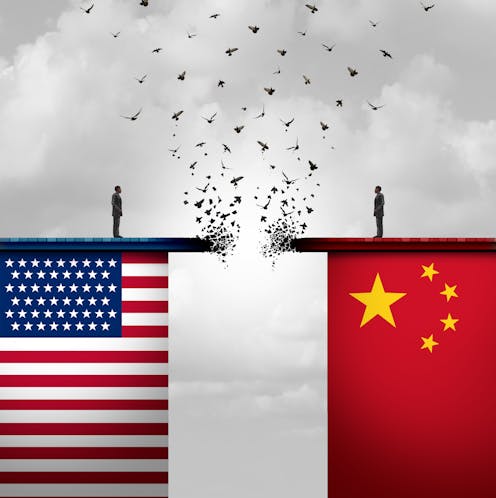Joe Biden has said the US wasn't trying to 'contain' China, but the evidence suggests otherwise
- Written by Tessa Morris-Suzuki, Professor Emerita, Australian National University

During an official visit to Australia in 2016, US President Joe Biden assured America’s Pacific allies that “We’re not trying to contain China[1]”. That assurance is looking very shaky now.
The Biden administration’s energetic promotion of the Quad grouping[2] and the AUKUS alliance[3] convey a message that few observers have difficulty interpreting. Defence Secretary Lloyd Austin has been particularly clear, speaking of mobilising “all tools of national power” to create “guardrails” to block China from displacing America from its global leadership role.
As Financial Times editor Edward Luce observes, containing China[4] is now Biden’s explicit goal.
The Cold War mantra
What exactly is meant by “containing”? We seldom talk about “containing” France, Britain or the United States, for instance. In the imagery of containment, “they” are always unruly and liable to overstep their boundaries. Meanwhile, “we” are always the sedentary targets of that expansionism.
If the US is to contain China, it must lead a global alliance committed to the same goal. This is evidently what the US hopes to do. This aspiration is making many of its allies increasingly uncomfortable.
“Containment” was the great Cold War mantra. Its origins can be traced to American diplomat George F. Kennan, whose 1946 “long telegram” to the State Department called on the US government to develop a strategy for preventing[5] the spread of the “malignant parasite” of Soviet communism.
In an anonymous 1947 article in the journal Foreign Affairs, he labelled this strategy as “containment”, and stressed that Soviet expansionism[6] had deep roots in the “Russian-Asiatic” psyche.
This did not deter US policymakers from applying his containment strategy – with even greater enthusiasm – to China following the 1949 establishment of the People’s Republic in Beijing.
As geographer Charles Fisher pointed out in the early 1970s, the idea of “containing China” echoed much older European and US images of the world[7]. Fisher highlighted the influence of 19th and early 20th century civilisation theorist Halford Mackinder, whose thesis on “the geographical pivot of history” played “a seminal part in the development of the containment doctrine”.
European civilisation was seen as “the outcome of the secular struggle against Asiatic invasion” embodied in the invasions of the “Mongol hordes which fell upon Europe in the 14th century”. The rise of steam power and the railways had created the prospect of the emergence of a new landlocked Eurasian power that would challenge western civilisation.
Widespread public acceptance of Cold War containment policy towards China, Fisher argued, stemmed partly from its resonance with older, western images of the world.
[…] in the 1950s, it seemed that a single vast Eurasian Communist bloc now stretched like the old Mongol empire from the plains of eastern Europe to the shores of the China Sea, there to confront the United States across a rapidly shrinking Pacific Ocean.
With the rise of powerful revolutionary movements in Southeast Asia, American foreign policy became haunted by the vision of the “virus of communism” spreading from China across Asia. China became the chief object of US containment. In the words of journalist Don Oberdorfer, Vietnam became “‘the place to draw the line’ against the communist tide and especially against the Chinese hordes seen as the most virulent and threatening manifestation[8] of international Marxism”.
References
- ^ We’re not trying to contain China (www.youtube.com)
- ^ Quad grouping (theconversation.com)
- ^ AUKUS alliance (theconversation.com)
- ^ containing China (www.ft.com)
- ^ US government to develop a strategy for preventing (nsarchive2.gwu.edu)
- ^ Soviet expansionism (www.foreignaffairs.com)
- ^ older European and US images of the world (www.jstor.org)
- ^ most virulent and threatening manifestation (www.washingtonpost.com)
- ^ based on fabricated sources (www.npr.org)
- ^ simple image of a global bully (www.stratcom.mil)
- ^ Biden’s China policy (www.whitehouse.gov)
- ^ not looking for conflict (www.state.gov)
- ^ no role for diplomacy (www.foreignaffairs.com)
- ^ clearly divided views (www.politico.com)
- ^ Retno Marsudi said (www.thejakartapost.com)

















